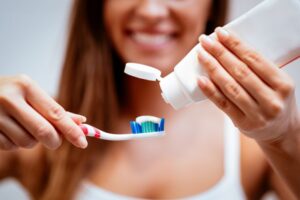
The vast majority of people will get a dental cavity at least once in their lifetime; in fact, cavities are one of the most common oral health conditions! But what if you have had some (or all) of your teeth replaced by dental implants? Are cavities still something you need to worry about? This blog post explains some interesting information that will help you take good care of your smile.
Dental Implants Cannot Get Cavities
Cavities form when bacteria in your mouth interact with sugars and starches. The bacteria feed on sugar and form a biofilm on your teeth called plaque. Plaque is acidic, and the longer your teeth are exposed to it, the greater the chance that it will weaken your enamel and lead to the formation of little holes (cavities).
The cavity formation process requires that at least three things be present: oral bacteria, sugar or starch, and tooth enamel. When you get dental implants, there is no natural tooth enamel that plaque can attack. Therefore, your new teeth become impervious to cavities!
However, your invulnerability to cavities does not mean that you can neglect oral care.
The Importance of Caring for Your Smile with Dental Implants
Brushing and flossing can play a huge role in protecting your natural teeth from cavities, but these habits remain important even for individuals who no longer have any of their original dentition.
An overgrowth of oral bacteria can allow plaque to form along your gumline. It can invade the tissue around your implants and lead to a dangerous infection. Without timely intervention, that infection can cause serious damage. It might even cause your dental implants to fail! Fortunately, a thorough oral hygiene routine can prevent that sad outcome.
Tips for Maintaining Your Implants
In many ways, taking good care of dental implants is just like taking care of natural teeth. You should:
- Brush twice a day with a soft-bristled toothbrush.
- Floss or use a water flosser to clean tight spaces in your mouth. (If you have a dental implant bridge, be sure to clean underneath it.)
- Use an antibacterial mouth rinse if recommended by your dentist.
- Attend regular dental checkups.
- Avoid bad habits that might damage your oral tissues or your implants, such as smoking or biting on hard objects.
Dental implants cannot get cavities, but you still have to protect them from oral bacteria! Maintain a good oral hygiene routine so your restored smile can stand the test of time.
Meet the Practice
At Piney Point Oral & Maxillofacial Surgery of Houston, our four highly skilled oral surgeons provide a broad range of services, including dental implant placement, dental implant salvage, and more. If you have questions about what to expect with this form of tooth replacement or how to get the most out of it, we would be pleased to speak with you. Contact our office at 713-783-5560.
